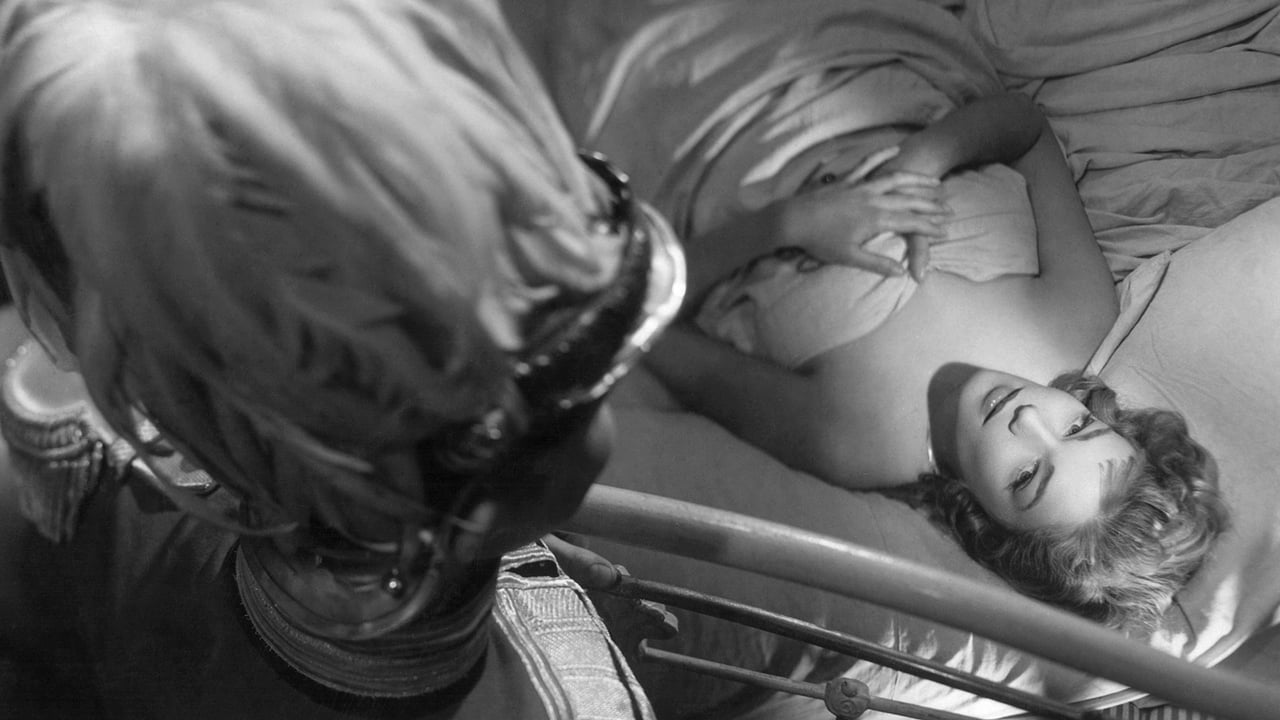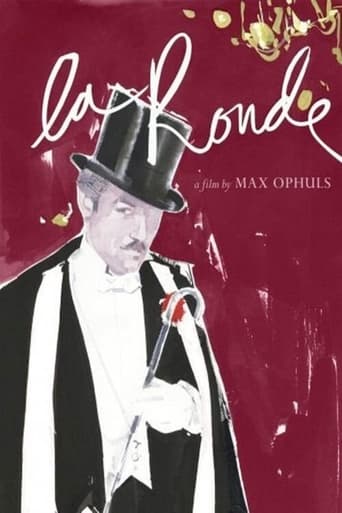



I like the storyline of this show,it attract me so much
View MoreVery well executed
Really Surprised!
The plot isn't so bad, but the pace of storytelling is too slow which makes people bored. Certain moments are so obvious and unnecessary for the main plot. I would've fast-forwarded those moments if it was an online streaming. The ending looks like implying a sequel, not sure if this movie will get one
View MoreI like to avoid films that are too "theatrical" and/or "musical." This film is one of the few that showed me the there is a way to make the combination intriguing. I loved the self-conscious narrator. Despite the annoying singing (imo), he is a comic relief. He makes you take another look at the sequence before and after his appearance. Yes, there are symbolism and commentary in the film. But noticing these is not necessary to enjoy the wonderful cyclical visual storytelling. As the narrator says we are here for "the love of art of love" or the dirtiness of it depending on which way you look. Simple and masterful enough. I agree with the other commenters praising Ophüls' style.
View MoreIf we look at every particular story, this is just like any other romantic movie. But seeing it as a whole makes it a grand & poetic romantic charmer. Story is set in Vienna,1900. Starts with a street hooker falling for a young soldier and then begins a humorous chain of romantic affairs going through various personnel of different classes until the end of the circle. Every love affair is basically somewhat superficial and illegitimate in some aspect too. But the masterful story-telling of Max Ophuls don't let us think about anything else. The sets,music adds up into its mood of romance. The flowery conversations between the characters are like treat. Movie's main strength is its narration. Anton Walbrook brilliantly does that job. It flows through time and place, the narrator is all-knowing so there is no boundary in the story. He brilliantly appears in different looks and serves as a charming guide in this endless journey. Every character has its own personality, and within very small time they leave their mark. Affairs of different classes & professionals are brilliantly combined in the tremendously romantic city of Vienna. It is surprising how a movie entirely shot in one studio gives a ride through a whole city of different time and place. Overall this is a fascinating cycle of love, definitely worth going through. If you are in a bad mood, this movie can be a possible cure. Spellbinding and enormously pleasant.
View More"What is still missing for love to start its rounds? A waltz...and here it is. The waltz turns. The carousel turns...and the merry-go-round of love can begin turning, too." If Le Plaisir is a clever study in how pleasure can lead to despair, hopelessness and, fortunately, more pleasure, and if Madame D... is a masterpiece of love's elegant sadness, perhaps La Ronde can be seen as a carousel of pleasure, where men and women's most natural instinct is celebrated with joy and infidelity. Max Ophuls' La Ronde is a wonderful mixture of anticipation, pleasure and rue. It might even make you think wisdom could be involved. We're now in Vienna in 1900, a world of waltz, where lovers change lovers until we come back full circle. This delightful waltz includes counts, maids, actresses, soldiers, poets, prostitutes and married couples. Thanks to our host and escort, played by Anton Walbrook, we are not simply observers. We're complicit. "I am you," he tells us, "the personification of your desire to know everything." On this carousel of pleasure, amusingly disguised for some as love, we can savor both the situations and the actors that Max Ophuls has given us. Ophuls is the master chef, but it is the likes of Danielle Darrieux, Jean-Louis Barrault, Simone Simon, Simone Signore, Gerard Philipe and all the rest who keep this soufflé from falling. And speaking of falling, one of the most amusing and endearing episodes is our host encountering a momentary breakdown of the carousel, then fixing it in time for Daniel Gelin to continue with his waltz in the arms of Madame Breitkopf (Darrieux). "True love is possible only where there is truth and purity" says Madame Breitkopf's husband to her in bed one evening, the afternoon after her meeting with the young man played by Gelin. The next evening he'll meet the young girl he will make his mistress. Thank goodness truth and purity have little to do with pleasure, which needs only desire, a bit of self-delusion and a willingness not to learn from experience, It's difficult to watch Madame D... without wanting to weep. It's difficult to watch La Ronde without wanting to smile. This is a movie to take delight in just as it is, without too much earnest analysis. Not the least of its charms is the recurring waltz, "Der Reigen" by Oscar Straus, which our lovers dance to in each other's arms.
View MoreI've just read all the previous comments on this and I'm surprised that none of them apparently grasped that the main thrust of the plot was the passing of venereal disease from one character to another. It's not just coincidence that the first coupling is between a prostitute and a soldier - prostitutes traditionally work near army barracks and are, or arguably were in 1900, more likely to be carriers of venereal disease than most other women simply because by definition they had sex with more men than the average woman, married or single, in 1900. The vastly overrated semi-Amateur film maker Jean-Luc Godard dismissed both the film and one of France's leading actors (Gerard Philippe) with the words 'France's worst actor in France's worst film', which in itself should be sufficient to send all intelligent people flocking to see La Ronde. It is, of course, dated. It has to be, it was made 54 years ago yet it still retains that quality that has always eluded and will always elude Godard, Style. What if not stylish should we call it when our self-appointed narrator, Anton Walbrook, discards his slightly down-market raincoat and dons an opera cape to lead us to a sleazy quarter of Vienna and make us privy to the initial sexual encounter, the first, of course, of many, between prostitute Simone Signoret and soldier Serge Reggiani (soon to play similar roles in Jacques Becker's 'Casque d'Or') and provide the first 'take' on love/sex which is indifference; even when Signoret is prepared to waive her fee Reggiani disdains free sex on the grounds that her room is a ten minute walk from where they met and only reluctantly does he finally agree to an al fresco coupling from which he hurries away with barely a 'thank you', let alone a cigarette. Cynicism is still rampant in the next encounter in which Regginani seduces Simone Simon's comely housemaid then hurries back to the dance where they had met. Cynicism of a different sort informs the next encounter when the young man of the house (Daniel Gelin) where Simon is employed practices his seduction technique on her before attempting it with the real thing in the shape of older, married Danielle Darrieux. This episode, together with its successor (Darrieux and her husband, Fernand Gravey) serves as a filmic equivalent of an interval in a theatre (the film is based, as is widely known, on a play by Viennese playwright Artur Schnitzler)and Gelin's initial impotence is metaphored subtly (for 1950) by the breaking down of the roundabout which allows Ophuls to cut away to Walbrook in mechanic mode and then back to a now successful Gelin consummating his infatuation for Darrieux. And so it goes on, brief encounters, longer liaisons, just like life in fact. Virtually all of the cast had or would appear in classic films, not least Jean-Pierre Barrault, so memorable in 'Les Enfants du Paradis', Gerard Philippe, the original 'Fanfan le Tulipe' with 'Les Orgueillex' still to come, Serge Reggiani, a veteran of 'Les Portes de la Nuit', laughed off the screen in 1946 and now regarded rightly as a masterpiece, and so on, arguably only Isa Miranda as the actress let the side down. All in all a triumph. 8/10
View More